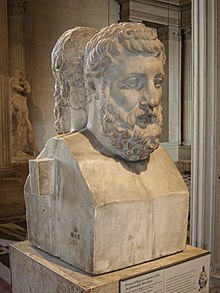Metrodorus of Lampsacus (the younger)
3rd-century BC Greek Epicurean philosopher
Metrodorus of Lampsacus (331/0 – 278/7 BC) was a Greek philosopher of the Epicurean school.

Quotes
edit- Occupavi te, Fortuna, atque cepi omnisque aditus tuos interclusi, ut ad me adspirare non posses.
- I have prevented you, Fortune; I have caught you, and cut off every access, so that you cannot possibly reach me.
- Attributed to Metrodorus by Cicero, Tusculanae Disputationes, V, IX, 27, as translated by W.H. Main, Tusculan Debates, Pickering, 1824, p. 237.
- I have prevented you, Fortune; I have caught you, and cut off every access, so that you cannot possibly reach me.
- Mortale est omne mortalium bonum.
- All the Good of mortals is mortal.
- Attributed to Metrodorus by Seneca, Epistulae morales ad Lucilium, XVI, 98, 9, as translated by Richard Mott Gummere, Moral letters to Lucilius, Loeb Classical, 1925.
- All the Good of mortals is mortal.
- Esse aliquam cognatam tristitiae voluptatem [...].
- There is a certain pleasure akin to sadness [...].
- Attributed to Metrodorus by Seneca, Epistulae morales ad Lucilium, XVI, 99, 25, as translated by Richard Mott Gummere, Moral letters to Lucilius, Loeb Classical, 1925.
- There is a certain pleasure akin to sadness [...].
- [...] The source of happiness in ourselves [is] greater than that which arises from objects.
- Attributed to Metrodorus by Clement of Alexandria, Stromata, II, 21, as translated by Alexander Roberts, James Donaldson, Clement of Alexandria, vol. II, in Ante-Nicene Christian Library: Translations of the Writings of the Fathers Down to A.D. 325, vol. XII, 1869, p. 74.
- Remember, O Menestratus, that, being a mortal endowed with a circumscribed life, thou hast in thy soul ascended, till thou hast seen endless time, and the infinity of things; and what is to be, and what has been.
- Attributed to Metrodorus by Clement of Alexandria, Stromata, V, 14, as translated by Alexander Roberts, James Donaldson, Clement of Alexandria, vol. II, in Ante-Nicene Christian Library: Translations of the Writings of the Fathers Down to A.D. 325, vol. XII, 1869, p. 300.
Bibliography
edit- Alfred Körte, Metrodori epicurei fragmenta, Leipzig, Teubner, 1890.